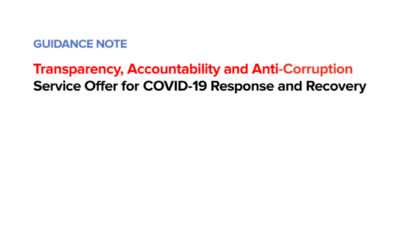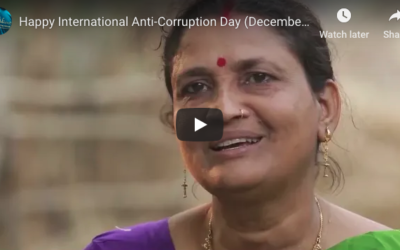
According to the Barometer of the Americas nearly 70 percent of Latin American interviewees admitted having been asked for a bribe in the past year. But there’s room for hope: 86.3 percent of interviewees stressed that paying a bribe as unjustifiable, according to the same survey. In recent years Latin Americans have increasingly demanded more accountable, open and transparent governments that can readily respond to citizens’ needs. In this context, adopting transparency and accountability practices and mechanisms are essential create trust, dialogue and cooperation between institutions, private sector and civil society. These are necessary steps to boost institutions and public authorities’ legitimacy.The United Nations Development Programme (UNDP) in Latin America and the Caribbean has been enhancing the capacity of governments, civil society and the private sector in designing and implementing tools to improve transparency and accountability—essential for the region’s democratic governance.
The new 2030 Agenda for Sustainable Development, including the Sustainable Development Goals (SDG) and in particularly SDG 16, explicitly link good governance with peace, justice and inclusive societies, emphasizing crisis prevention mechanisms and transparency as crucial steps for strong institutions. Empowering and promoting citizen participation is key. In our region we particularly focus on youth, women, indigenous peoples and Afro-descendants, who—in spite of the progress—still lag behind, including in terms of political participation.But there are some innovative initiatives out there.For example, in Colombia, UNDP has supported the construction process of the Comprehensive Anti-Corruption Public Policy, in order to strengthen the tools and mechanisms to prevent, investigate and punish corruption. Working at a local level – or with a “territorial policy approach”— we have partnered with 12 regional departments, working with state and non-stake actors to include the population in decision-making processes.
- Haiti UNDP has supported the School for the Judiciary by training 190 judges— including from the Electoral Court, Justices of the Peace and Government Commissions—to enhance skills, share best practices from other countries in the region and establish links and networks for South-South Cooperation.
- Peru UNDP has a Transparency and Ethics in Public Institutions initiative with the Peruvian Press Council which encourages institutions at all government levels to comply with the Transparency and Access to Information Law. We train officials, promote citizen oversight and accountability. This project is conducted with special emphasis on Municipalities and Regional Governments to introduce the concepts and practices of open government, which encourages that citizens access documents and government proceeding, enabling effective public oversight, among other matters.
- Costa Rica, our “Transparency and Accountability in the Associations of Rural Water Supply” initiative has influenced the management of drinking water and sanitation at the local level, with results seen in several communities, which now also abide to guidelines on participation, transparency and accountability. The initiative stems from UNDP’s Water Governance Facility partnership with the Stockholm International Water Institute and has led to a new implementation plan that has helped authorities apply guidelines, train staff and managers at the local and national levels with improved water management.
- Chile, UNDP has supported the Commissions of Ethics and Transparency in the upper and lower houses of parliament by designing a model that improves integration, functions and procedures. Civil society has been involved in decision-making mechanisms, joining such commission and including proposals to promote integrity and transparency, as was the case of the Constitutional Act of Congress bill. This Chile-UNDP initiative was highlighted as a best practice during theOpen Government Partnership Global Summit held in Mexico in October.
These examples show that countries have been advancing to adopt and promote laws and public policies that are crucial to fight corruption in crucial sectors for sustainable development. Health, water, education, environment or public safety sectors have been among the top targets, also using new communication technologies for monitoring and reporting corrupt practices.Of course there is still a long way to go. But we are moving forward towards becoming more transparent and accountable. And that’s crystal clearClick here for original article.





